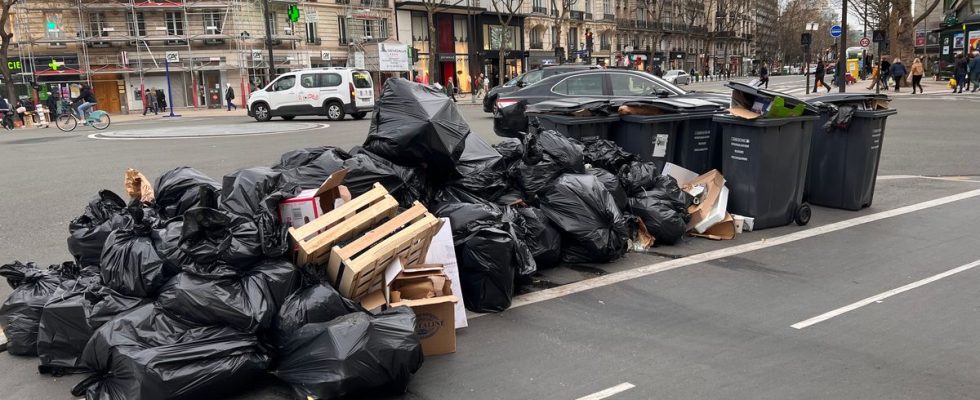The capital is swimming in a sea of garbage that will continue to rise. This Tuesday, garbage collectors voted to extend the strike in Paris until next Monday, March 20. As a bonus, the incinerator of Ivry-sur-Seine will also remain blocked. Suffice to say that Parisians may soon lose their footing.
Already concerned about the future of their trash cans, individuals and traders are beginning to worry about the health consequences of the accumulation of waste, more than 6,600 tonnes recorded on Tuesday, in the streets and on the sidewalks of the city.
Safety, “absolute priority” of the City of Paris
On this subject, the municipality showed itself determined Monday evening during a press briefing on the subject. “Salubrity is our absolute priority,” said Colombe Brossel, deputy mayor of Paris in charge of the cleanliness of public spaces, sorting and reducing waste. For this, the elected official set out a series of emergency measures such as systematic cleaning after each food market, especially on weekends.
The City of Paris also promises the deployment of containers and iron boxes in order to limit as much as possible leaving waste on the ground, in particular garbage bags likely to contain foodstuffs. “Palliative measures”, meager dykes in the face of an inexorable rise in garbage. If Colombe Brossel wanted to be reassuring “as long as the garbage bags are well closed”, the health risk seems very real.
A “worrying” risk
“We must not minimize the microbiological risks, assures Romain Lasseur, doctor in animal toxicology, the very smell which emerges from it reflects a colonization of the garbage cans by bacteria. According to the scientist, the risk is even “concerning”.
The biggest risk, of course, comes from the rats, dear city mates that proliferate in our basements. According to Romain Lasseur, thinking that closed bags will stop them is heresy. Opportunistic and invasive, if the rodent smells food, it comes out and attacks it: “It’s an animal that cuts electrical cables. So a garbage bag does not scare him. »
Rat proliferation and leptospirosis
And rats can carry a number of parasites and diseases with them. The most to be feared according to the expert is leptospirosis. Also nicknamed sewer disease for its ability to spread in damp environments, it is a bacterial disease well known to garbage collectors and transmitted to humans by certain mammals.
According to the website leptospirosis-prevention, The bacteria called “leptospires” are “mainly stored in the kidneys of contaminated animals and then in their urine. They then contaminate their coat and their environment.”
“It is a disease that can be fatal. Of the 700 cases observed per year in France, nearly 10% lead to death,” warns Romain Lasseur. Above all, it is a resistant bacterium. According to the expert, in a humid environment, it can remain active for almost six months.
Food waste, the main cause of risk
Other diseases such as salmonellosis, worms, ringworm or hantaviruses can be transmitted by rats. Not just by bites but by casual contact or when food is soiled with rat saliva, urine or feces.
Also, with the accumulation of food waste in our streets, the proliferation of rats could become very problematic: “If the females are well fed, we will see a population peak in three to four weeks”, warns the scientist.
Even the Regional Health Agency (ARS), contacted by 20 minutes, calls for caution: “While previous experiences did not seem to lead to an epidemic or imminent danger to public health, it remains necessary, as in any exceptional situation, to strengthen health surveillance. “Also, the ARS announces to increase its level of vigilance, on the lookout for any” unusual increase in pathologies possibly linked to the situation “.
So to limit the risks, it is strongly to avoid any contact with elements which could be soiled and to wash your hands as often as possible. Moreover, even if they become difficult to avoid, it is better to keep children, but also dogs, cats and all pets away from the garbage bags that litter the streets. Preventively, and as much as possible, it is better to keep food waste at home, and well wrapped, for as long as possible.

